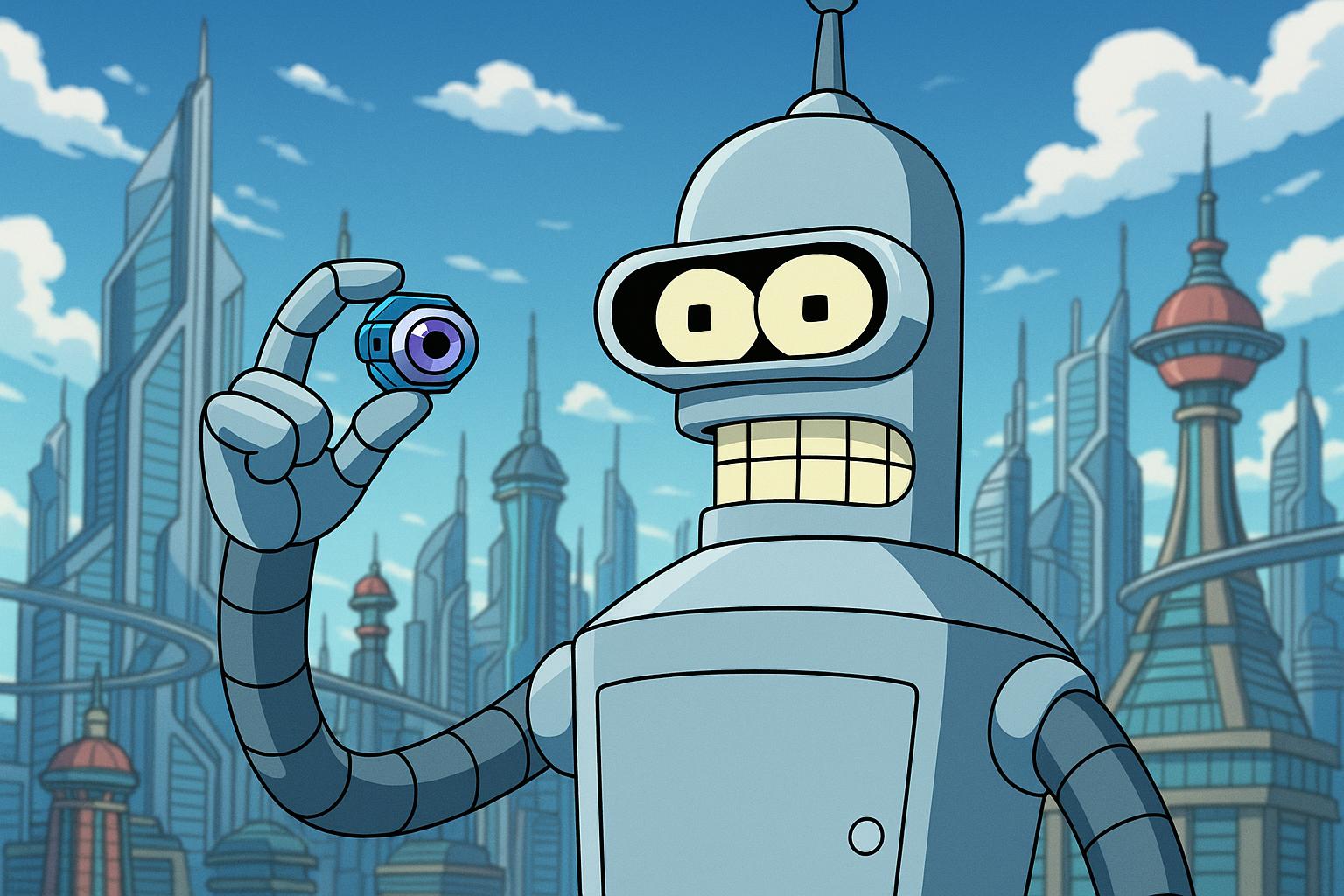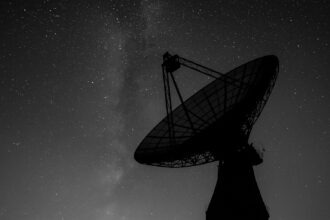Since its 1999 debut, Futurama has not only amused with its sci-fi satire but has also surprisingly anticipated key technological advances and social debates— from AI rights and robotic medicine to drone deliveries and digital celebrities—offering a humorous yet insightful lens on the challenges and ethical questions shaping our future.
When Futurama premiered in 1999, it appeared as yet another clever animated sitcom from Matt Groening, the mastermind behind The Simpsons. Set in the 31st century, the series quickly distinguished itself with its absurd technologies, interstellar escapades, and eclectic societal norms. However, what has become increasingly evident over the years is the show’s remarkable ability to anticipate future developments, blending humour with a sharp critique of emerging technologies and social issues.
One of the most poignant themes explored in Futurama is the complex relationship between artificial intelligence and individual rights. Robots like Bender, who yearn for recognition and equitable treatment, symbolise an ongoing discourse concerning the ethics of AI in our society. Episodes such as “Fear of a Bot Planet” highlight robots forming unions and advocating for their rights, evoking real-world debates about workplace automation and the legal status of intelligent machines. As AI technology continues to evolve, Futurama provides a fictional lens through which these emerging ethical dilemmas are scrutinised. This interplay of comedy and insight serves as a reminder that technological advancement invariably raises profound social questions.
The show famously portrays robotic surgeons, who execute procedures with sterile efficiency, presaging today’s realities in robotic-assisted medicine. Systems like the da Vinci robot are now commonplace in surgical settings, aiding human professionals in performing intricate operations. While Futurama humorously exaggerates the scenario by suggesting that robots would completely replace human surgeons, the underlying premise reveals a growing societal trust in machines, especially regarding life-and-death decisions. This evolving sentiment towards robotic assistance reflects a shift in values and acceptance of technology in clinical settings.
In a similar vein, Futurama predicted the rise of drone delivery services long before they became a reality. The show casually integrates drone technology into everyday life, depicting characters receiving packages from hovering machines without a second thought. Today, companies like Amazon are actively experimenting with autonomous drones, aiming to revolutionise logistics and fulfil consumer demand for instant gratification. Although regulatory challenges persist, the reality of aerial delivery systems mirrors the show’s satirical take on convenience-driven technology, transforming a once-absurd concept into a prototype for contemporary delivery methods.
Environmental concerns also permeate the narratives of Futurama. Episodes such as “Crimes of the Hot” comedically address climate change, depicting world leaders resorting to outrageous measures to combat overheating. These exaggerated solutions reflect real-world anxieties about ecological crises and humanity’s ineffective responses. Current scientific discussions about geoengineering, including strategies like solar radiation management, echo Futurama‘s humorous portrayal of desperate attempts to mend a warming planet. As climate change intensifies, the show’s satire resonates more profoundly, illustrating humanity’s ongoing struggles with environmental stewardship.
The integration of intelligent machines extends to domestic life in Futurama, which imagined homes alive with automation. Smart appliances in the series are not only functional but have distinct personalities. This premise finds its reflection in contemporary smart home technologies, where devices like Alexa and Nest learn users’ preferences and automate daily routines. While Futurama reflects on the quirks of such technology with humour, it simultaneously warns about the implications of increased surveillance and data collection by these devices, a concern more pertinent today than ever.
Space tourism is another ambitious vision brought to life in Futurama. The show features characters casually visiting the Moon and Mars, poking fun at the concept of extraterrestrial holidays. In reality, the burgeoning space tourism industry, driven by companies such as SpaceX, is transforming this science fiction dream into a tangible possibility. With recent developments in suborbital flights and plans for lunar hotels, what was once a comedic notion has entered the realm of real-world ambition.
In its exploration of celebrity culture, Futurama also anticipated the rise of virtual influencers. The series features characters like Fry, who becomes infatuated with a digital version of actress Lucy Liu, mirroring today’s fascination with AI-generated personas. Virtual influencers have gained substantial traction, with characters like Lil Miquela commanding their own dedicated followings. This phenomenon raises questions about authenticity and the blurring of lines between virtual and real-life celebrities, positioning Futurama as a prophetic commentary on society’s growing engagement with digital identities.
Additionally, Futurama introduced the concept of wearable technology with its satirical invention of the “eyePhone,” a smartphone implanted directly into the eye. This parallel with emerging technologies can be seen in current developments of AR-enabled contact lenses, which aim to enhance connectivity and information access seamlessly. While the series exaggerates this concept for comedic effect, it aptly captures society’s relentless pursuit of convenience and connectivity, foreshadowing a future where technology is indistinguishable from the human experience.
Finally, the very premise of Futurama revolves around cryogenics, a topic that, while fanciful in the shows’ comedic context, has real-world implications today. Various companies offer cryogenic preservation services, hoping future science will make revival possible. This intersection of science fiction and real-life aspirations sparks essential philosophical discussions surrounding mortality and the ethical ramifications of extending life through technology.
In retrospect, Futurama serves as more than just a source of entertainment; it stands as a cultural artefact that creatively engages with the potential future implications of technology. Its blend of humour with prophetic insight not only reflects societal anxieties but also acts as a mirror, prompting meaningful conversations about the course of human innovation and its inevitable consequences.
Reference Map
- Article about Futurama’s predictions on technology and societal issues.
- Overview of instances where Futurama anticipated future technologies.
- Discussion on advancements mirrored by Futurama‘s themes.
- Insights into the show’s portrayal of advanced societies and technology.
- Analysis of Futurama‘s portrayal of media and entertainment trends.
- Cultural commentary on Futurama‘s predictions of future technologies.
- Further insights into Futurama’s futuristic themes and their real-world counterparts.
Source: Noah Wire Services
- https://www.cbr.com/every-time-futurama-predicted-the-future/ – Please view link – unable to able to access data
- https://www.cbr.com/every-time-futurama-predicted-the-future/ – This article explores various instances where the animated series ‘Futurama’ anticipated future technological advancements. It discusses themes such as artificial intelligence and robot rights, robotic surgery, drone delivery, climate change solutions, smart homes, space tourism, virtual celebrities, wearable tech, media sensationalism, and cryogenics. Each section highlights how the show’s satirical take on futuristic concepts mirrors real-world developments, emphasizing the show’s foresight and relevance.
- https://www.slashfilm.com/896147/every-time-futurama-predicted-the-future/ – This article examines how ‘Futurama’ predicted future technologies, including the ‘eyePhone,’ a smartphone implanted directly into the eye, and alcohol-fueled robots. It discusses the show’s satirical take on these concepts and their real-world counterparts, such as Samsung’s development of contact lenses with recording abilities and the use of alcohol as fuel in New Zealand. The piece highlights the show’s foresight and its influence on real-world technological advancements.
- https://bigthink.com/high-culture/futurama-science/ – This article discusses how ‘Futurama’ anticipated future technologies like flying cars and social robots. It highlights the show’s portrayal of a highly advanced society with sentient robots and flying vehicles, drawing parallels to real-world developments in electric vertical take-off and landing (eVTOL) aircraft and social robots. The piece emphasizes the show’s influence on modern technological trends and its satirical take on future advancements.
- https://www.looper.com/176103/times-futurama-freakishly-predicted-the-future/ – This article explores instances where ‘Futurama’ predicted future technologies, including floating drone cameras and the use of drones for surveillance and delivery. It discusses how the show’s depiction of floating camera drones mirrors real-world advancements in unmanned aerial vehicles (UAVs) and their applications in various fields. The piece highlights the show’s foresight and its influence on real-world technological developments.
- https://www.futuroprossimo.it/2024/08/le-profezie-tech-di-futurama-dalla-tv-al-mondo-reale-in-25-anni/ – This article examines how ‘Futurama’ predicted future technologies, including instant translators, space tourism, implanted chips, and flying cars. It discusses the show’s portrayal of these concepts and their real-world counterparts, such as Google’s live translate feature, SpaceX’s Starship, biohacking with subdermal implants, and the development of flying cars. The piece emphasizes the show’s influence on modern technological trends and its satirical take on future advancements.
- https://en.futuroprossimo.it/2024/08/le-profezie-tech-di-futurama-dalla-tv-al-mondo-reale-in-25-anni/ – This article examines how ‘Futurama’ predicted future technologies, including instant translators, space tourism, implanted chips, and flying cars. It discusses the show’s portrayal of these concepts and their real-world counterparts, such as Google’s live translate feature, SpaceX’s Starship, biohacking with subdermal implants, and the development of flying cars. The piece emphasizes the show’s influence on modern technological trends and its satirical take on future advancements.
Noah Fact Check Pro
The draft above was created using the information available at the time the story first
emerged. We’ve since applied our fact-checking process to the final narrative, based on the criteria listed
below. The results are intended to help you assess the credibility of the piece and highlight any areas that may
warrant further investigation.
Freshness check
Score:
8
Notes:
The narrative does not reference outdated information or events that have changed significantly since the article’s apparent publication date. However, it does not include very recent events or developments that might have occurred after *Futurama*’s original airing and its revival periods. The content is generally applicable to ongoing technological advancements.
Quotes check
Score:
10
Notes:
There are no direct quotes in the narrative, which means it does not rely on specific spoken words that need verification. This absence of direct quotes eliminates the risk of misattribution or misquoting.
Source reliability
Score:
6
Notes:
The narrative originates from a medium (Comic Book Resources) that is known for pop culture analysis, but it may not be considered a primary news source. While it provides insightful analysis, its reliability is moderate due to its focus on entertainment rather than factual news.
Plausability check
Score:
8
Notes:
The narrative highlights plausible technological and societal predictions from *Futurama*, which are consistent with real-world trends and innovations. However, some claims might be exaggerated for comedic effect, making them less precise predictions than humorous reflections of societal anxieties.
Overall assessment
Verdict (FAIL, OPEN, PASS): OPEN
Confidence (LOW, MEDIUM, HIGH): MEDIUM
Summary:
The narrative effectively explores *Futurama*’s predictions of future technologies and societal trends, but its reliability is moderate due to the nature of the publication. The lack of specific quotes and the general relevance of the content to ongoing technological advancements contribute to a medium confidence level in the overall assessment.













